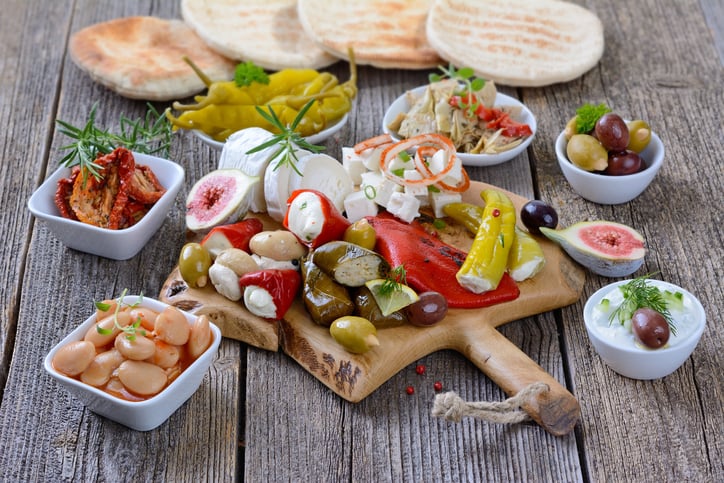What Is the Mediterranean Diet? (With Answers to Your Most Pressing Questions)

If you’re like most people, the word “diet” gives you pause. So, let me start first with this disclaimer: While the Mediterranean Diet includes the D-word, it’s more of a complete lifestyle than a “diet.” The full focus of the Mediterranean Diet plan includes mindful eating and sound nutrition habits derived from people who live in various countries that border the Mediterranean Sea.
Unlike restrictive diets, there’s no need to count calories or adjust macros. It’s an easy-to-follow lifestyle protocol that’s consumer-friendly. It was never intended to be commercialized, but because it was found to be effective as a weight-loss and health-promoting tool, it rose to become somewhat of a sensation in the 1990s.
Today, we’ll dive into what the Mediterranean diet is, the most common foods, its potential benefits, the research behind it, and find answers to your most pressing questions. More importantly, we will show you how to start the Mediterranean diet if you aren’t yet familiar with the plan.
One more note before we get started: The Mediterranean Diet may be adjusted to suit your individual needs and preferences. The meal plan is not written in stone. It can be adapted to meet your lifestyle and eating habits. If you have questions about this, please comment below, and we’ll gladly discuss how to adjust the plan to fit your needs and goals.
In addition, if you have been diagnosed with a disease or illness or are under the care of a physician, we highly recommend you work with your healthcare team before making any changes to your diet or exercise program.
The Mediterranean Diet Food Pyramid

Like the USDA Food Guide, the Mediterranean Diet provides a food pyramid. The arrangement, though, is different. In short, the Mediterranean Diet recommends:
- a high intake of extra virgin (cold-pressed) olive oil, vegetables (e.g., leafy green vegetables), fruits, cereal grains, nuts, pulses/legumes;
- a moderate intake of fish and other light meats, dairy products, and red wine;
- and low intakes of eggs and sweets.
The Mediterranean Diet Plan
While these guidelines may seem a bit generic, here’s the intent behind them:
- Compared to a current Western diet, the Mediterranean Diet is higher in fiber, plant nutrients, vitamins (e.g., folate), antioxidants, and minerals
- The diet is also lower in sugars and refined starches than the current Western diet
- Whole, natural foods (with limited processed foods)
- When available, seasonal and locally grown foods
- The main sources of daily nutrition come from vegetables, fruits, beans, potatoes, nuts, seeds, breads, and other whole-grain products
- Fats are made up of monosaturated and polyunsaturated fats (trans fats) over saturated fats (cholesterol), with olive oil being the predominant fat source
- Dairy includes moderate amounts of cheeses and yogurt and < 4 eggs per week
- Fish and poultry are suggested in low to moderate amounts
- And there’s only a minimal inclusion of red meat (about once a month)
- Low to moderate amounts of red wine are suggested for adults—typically consumed with a meal
The Mediterranean Diet Plan
While these guidelines may seem a bit generic, here’s the intent behind them:
- Compared to a current Western diet, the Mediterranean Diet is higher in fiber, plant nutrients, vitamins (e.g., folate), antioxidants, and minerals
- The diet is also lower in sugars and refined starches than the current Western diet
- Whole, natural foods (with limited processed foods)
- When available, seasonal and locally grown foods
- The main sources of daily nutrition come from vegetables, fruits, beans, potatoes, nuts, seeds, breads, and other whole-grain products
- Fats are made up of monosaturated and polyunsaturated fats (trans fats) over saturated fats (cholesterol), with olive oil being the predominant fat source
- Dairy includes moderate amounts of cheeses and yogurt and < 4 eggs per week
- Fish and poultry are suggested in low to moderate amounts
- And there’s only a minimal inclusion of red meat (about once a month)
- Low to moderate amounts of red wine are suggested for adults—typically consumed with a meal
Exercise Is Included

While exercise is often recommended with most diets, it isn’t always required. With the Mediterranean Diet, exercise is part of the plan. The Mediterranean Diet—remember, it’s more of a lifestyle—not only encourages eating healthy foods, but it also places a huge emphasis on being active. Guidelines include a minimum of 2 ½ hours of moderate aerobic activity per week, preferably exercises that increase your heart rate and breathing. This may be one of the reasons this meal plan has been used for folks diagnosed with heart conditions as a heart-healthy option.
Some of you may be familiar with Bob Harper, the celebrity trainer, fitness guru, and past host of The Biggest Loser. Harper suffered a heart attack in 2017 at only 52 years old. He then adopted a Mediterranean Diet to help in his recovery. Harper said he pivoted his diet after his hospitalization. He now eats mostly whole foods like vegetables, fruits, nuts, beans and peas, unrefined grains, olive oil, and fish. Meat, dairy, and saturated fats are eaten sparingly.
The one thing he didn’t have to dial back on was flavor. Herbs and spices not only make foods taste good, but they also improve the health benefits and are an important part of the Mediterranean Diet.
Numerous studies have linked the Mediterranean Diet to a lower risk of cardiovascular problems and other health benefits. There is research to suggest that adhering to a Mediterranean Diet can not only cause weight loss and help prevent heart attacks, strokes, and type 2 diabetes, but it can improve your quality of life and help relieve depressive symptoms.
Another health benefit appears to be its effect on healthy insulin levels. As we get older, our hormones may lose some of their ability to properly convert the food we eat into energy, which is critical in fueling our cells. When this occurs, several things can happen, including insulin resistance. This can, in turn, wreak havoc on one’s ability to lose or maintain a healthy weight.
To combat a sluggish metabolism and insulin resistance, we need to reevaluate our diet and discover ways to properly fuel our bodies. Research has shown insulin resistance is reduced in people following a Mediterranean Diet.
By adjusting your diet and lifestyle, you can eat better, sleep better, have more energy, and be sharper and more focused, not to mention benefit from a lower risk for heart disease, some cancers, stroke, and dementia.
Enter the “Blue Zone”
The “Blue Zone,” which includes five regions in Europe, Latin America, Asia, and the U.S., has been identified by researchers as having the highest concentrations of centenarians in the world. Their diets focus on the following:
- Stop eating when your stomach is 80% full to avoid weight gain.
- Eat the smallest meal of the day in the late afternoon or evening.
- Eat mostly plants, especially beans. And eat meat rarely, in small portions of 3 to 4 ounces. Blue Zoners eat these small portions just five times a month, on average.
- Drink alcohol moderately and regularly, i.e., 1 – 2 glasses a day.
Sounds a bit like the Mediterranean Diet, right?
Dan Buettner has written several publications outlining just how impactful this way of life has been on the quality of life and longevity of the people living in these regions. Another important thing to understand about the Blue Zones is their focus on community and actively pursuing health and wellness. There is tremendous social support, and the community encourages and reinforces healthy behaviors.
I have always said how crucial social support is in allowing us to reach our goals, as well as good nutrition, regular exercise, and stress management. The people living in these regions have turned these healthy habits into lifestyle behaviors. Together, they’ve allowed people in these areas to be among the healthiest in the world. Some research suggests they’re less likely to suffer from heart disease, obesity, cancer, and diabetes due to these lifestyle differences.
Is the Mediterranean Diet Plan Right for You?
While eating healthy isn’t a new concept, learning which foods effectively promote optimal health, body composition, and performance for you may be something you haven’t quite mastered yet. There are various meal plans and diets. Of course, there isn’t a one-size-fits-all plan. It’s about discovering the most manageable and effective approach for you. The Mediterranean Diet may be one such approach.
Most Common Questions about The Mediterranean Diet
Q: Can the Mediterranean Diet help you lose weight?
A: Because the Mediterranean Diet encourages you to eat whole, nutrient-dense foods like vegetables, fruits, legumes, and healthy fats while decreasing the consumption of ultra-processed foods and fatty meats, most people naturally consume fewer calories.
People also feel fuller (as it’s high in fiber and healthy fats) and don’t need to be strict about logging calories. With the increased satiety and focus on quality over quantity, it’s well-known for helping people lose weight without going hungry or feeling deprived. In addition, physical activity is part of the plan, which also helps people maintain weight loss over the long run.
And because the diet isn’t overly restrictive, it’s easier to stick with. This can lead to gradual but sustained improvements in body composition.

Q: Does the Mediterranean Diet help control blood sugar levels (i.e., can it help manage diabetes)?
A: Consuming a variety of nutrient-rich, whole foods has a positive impact on blood sugar levels, which can be beneficial in the management of diabetes, particularly type 2 diabetes. Eating high-fiber foods like vegetables, legumes, whole grains, and fruits, which are the foundation of the diet, helps slow the digestion and absorption of carbohydrates. So, increases in blood sugar are more gradual. In addition, eating healthy fats, such as olive oil, nuts, and fatty fish, has been found to improve insulin sensitivity, which is vital for blood sugar management.
Finally, the diet is low in ultra-processed foods and sugars, which lead to blood sugar spikes. While the Mediterranean Diet isn’t considered “low carb,” the emphasis on eating complex carbs over simple sugars and refined carbs is beneficial for managing blood sugar.
Q: How does the Mediterranean Diet affect cholesterol levels?
A: The Mediterranean Diet positively affects cholesterol levels by improving the balance between LDL and HDL cholesterol. Healthy monounsaturated and polyunsaturated fats found in olive oil, nuts, and fish, which are also rich in omega-3 fatty acids, help lower LDL levels, which is beneficial for heart health. In addition, the Mediterranean Diet is low in saturated and trans fats from processed foods and red meats. Thus, it may help lower LDL cholesterol while improving the ratio between LDL and HDL.
LDL cholesterol levels are also lowered by eating a rich supply of soluble fiber from vegetables, whole grains, legumes, and fruits. These foods are also high in antioxidants, which may help reduce oxidative stress and help the body balance levels of inflammation, which could help lower cholesterol levels and support heart health.
Q: Can you combine the Mediterranean diet with other diet modifications (such as gluten-free or low-carb)?
A: Yes, because the Mediterranean Diet is flexible and inclusive in nature, it can easily be combined with other diet modifications. For instance, the Mediterranean Diet is rich in naturally gluten-free foods, including fruits, veggies, legumes, nuts, seeds, fish, and poultry.
You can also add gluten-free grains in place of traditional wheat-based products. Some good alternatives include quinoa, millet, buckwheat, and rice. Also, because the diet emphasizes whole foods over ultra-processed options, it can be easier to avoid hidden sources of gluten.
If you are following a lower-carb diet, it’s easy to adapt the Mediterranean diet to your preferences. Simply choose foods naturally low in carbs like leafy greens, non-starchy vegetables, nuts, and seeds, along with high-quality proteins like fish and poultry. Reduce the consumption of grains and legumes and focus on eating more non-starchy vegetables.
Fortunately, the Mediterranean diet is highly customizable. You can easily adjust the proportion of macronutrients to fit your dietary preferences while still adhering to the principles of the diet.
Q: Do I have to count calories while following the Mediterranean Diet?
A: One of the reasons the Mediterranean Diet is so popular is because there’s no need to count calories. The emphasis on quality and diversity of whole, nutrient-dense foods over strict calorie or macro tracking makes it easier to follow long-term.
Remember, the Mediterranean Diet is more of a lifestyle than a diet. It promotes enjoying meals with family and friends and eating healthy yet delicious meals mindfully. It’s also more flexible than many other diet approaches, without restricting calories or macronutrients. So, you can choose foods based on your personal preferences, lifestyle, and health goals.
Q: How does the Mediterranean Diet compare with other diets (e.g., keto, flexitarian, or high protein)? Which diet is better?
A: Each diet offers unique benefits and advantages. The best choice depends on your health goals, food preferences, and nutritional needs. The Mediterranean diet is widely recognized for its health benefits and sustainability. While the keto diet offers rapid progress in weight loss, the Mediterranean and flexitarian diets tend to be more balanced approaches, which may be easier to follow in the long term. Building muscle and decreasing appetite are two important benefits of a high-protein diet. This type of diet can be combined with Mediterranean Diet principles for greater fat-loss and muscle-building results for some.
Ultimately, the right diet for you is the one you can stick to that meets your nutritional needs and supports your health and wellness goals.
Q: What are the food restrictions with the Mediterranean Diet?
A: The Mediterranean Diet is more about overall eating patterns than strict rules. It’s less about eliminating foods and rather making healthy choices that support your health and energy levels. The diet is also flexible, so it can be adapted to meet various dietary needs and preferences.
That said, some foods are consumed less often, including red meat, ultra-processed foods and sugars, refined gains (e.g., white bread, pasta, and pastries), and trans fats and refined oils.
Q: I have a sweet tooth. Are sweeteners allowed? What sweeteners are preferred when following the diet?
A: The Mediterranean Diet minimizes added sugars and focuses on the natural sweetness of whole foods, such as fruits, instead. The diet offers flexibility for those who enjoy a sweet treat, and natural sweeteners can be used in moderation. Preferred sweeteners include honey, maple syrup, fruits, and dried fruits (such as dates). Other sweeteners to use sparingly include molasses and agave syrup.
Because this diet emphasizes whole and minimally processed foods, artificial sweeteners like aspartame, sucralose, or saccharine are generally not recommended.
Over time, you may find that the natural sweetness from whole fruits and other sweeter foods are tastier than the added sugars you may have been accustomed to in the past.
Q: Can I eat out when following the Mediterranean Diet?
A: Absolutely. The Mediterranean Diet is flexible and diverse, allowing for a variety of foods you can easily find when dining out. You do, however, want to be mindful of your food choices. For instance, choose vegetable-forward dishes, such as salads, grilled vegetables, or vegetarian options.
If the meal comes with grains, request whole-grain options, such as brown rice, quinoa, or whole-grain bread. Choose quality proteins like fish, seafood, chicken, or legumes. And ask for olive oil over other fats. Limit red or processed meats as well as ultra-processed foods.
Then enjoy your dinner with a glass of wine (preferably red) if you so choose. When checking out the dessert menu, look for fruit-based options sweetened with natural sugars, such as honey. Because it’s best to enjoy these in moderation, why not order one dessert and share?
Q: What if my diet differs? While I eat mostly whole foods, I enjoy a daily egg for breakfast and consume meat several times a month.
A: Even when following a particular meal plan or program, it’s important to be mindful of your needs and nutrition requirements.
While the guidelines may recommend a “limit” on how many times per week you should consume eggs, this is certainly not set in stone. The traditional Mediterranean lifestyle includes eggs less than four times per week. However, if you are accustomed to consuming one egg per day and that’s working for you, why fix what isn’t broken?
BioTRUST created a recent free report that gets into the nitty gritty about eggs. Several randomized controlled trials are cited in the report. Here’s the latest (most recently published) showing that an egg-based (3 eggs/day) lower carbohydrate (25% of calories) diet was superior to a standard carb-based diet (55% of calories):
After eight weeks, the egg-based diet resulted in greater fat loss (including belly fat) and better retention of lean body mass and metabolic rate. On top of that, it led to greater improvements in blood lipids (cholesterol, triglycerides) and insulin sensitivity.
So, if eggs are something you can’t imagine starting your day without, enjoy!
Q: Is alcohol consumption compatible with the Mediterranean Diet?
A: Alcohol consumption, particularly red wine, is often considered part of the Mediterranean Diet. However, moderation is key. A single glass with meals is the typical recommendation. Because red wine is rich in antioxidants (e.g., flavonoids), it may even help support a healthy heart.
And if red wine isn’t your preferred drink, a lower-alcohol beer or simple low-sugar cocktail made with fresh ingredients (e.g., gin and tonic with fresh lime) isn’t off limits. Just remember to keep any drinking in moderation (no more than one drink per day for women and two for men). That said, if you don’t want to drink, it’s not a requirement.

Q: Is it costly to follow the Mediterranean Diet?
A: Despite common misconceptions, following the Mediterranean Diet doesn’t need to be more expensive than any other type of diet. It’s all about how you shop for and prepare meals. For example, choose whole chicken cuts over skinless, boneless breasts, which tend to be more expensive. You can also choose canned varieties of fish like sardines or anchovies if fresh or frozen fish is less affordable in your region. Legumes are a staple protein source in the Mediterranean Diet, and they’re significantly lower in cost than most meat.
Because the diet emphasizes fresh fruits, vegetables, legumes, and whole grains, you can often make up most of your meals with seasonal options from local markets, which are usually more affordable. These options can be good for both budgeting and keeping weight in check.
The Mediterranean diet can fit almost any budget without compromising nutritional value. Just focus on eating whole, minimally processed foods over expensive or “Mediterranean” branded products.
Q: Does the Mediterranean Diet Work?
A: The Mediterranean Diet is widely recognized as one of the best diets due to its effectiveness. It’s been found to promote heart and brain health, support weight management, and reduce the risk of various diseases. It’s even been associated with increased longevity, potentially due to its ability to help reduce the risk of obesity, heart disease, and high blood pressure.
Because the diet provides a well-rounded intake of nutrients from a variety of food groups, people who adhere to the guidelines are more likely to consume a balanced mix of vitamins, minerals, and other essential nutrients.
Finally, the Mediterranean Diet is more of a lifestyle that emphasizes regular physical activities and social engagement, so its benefits extend beyond just the physical. This lifestyle can contribute to a more sustainable and enjoyable way to eat and to live.








